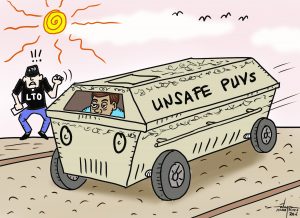By Walter I. Balane
MALAYBALAY CITY (MindaNews) – Clicking “I have read the terms and conditions of this service” is probably one of the biggest lies on the internet.
In 8 out of 10, we probably have never read. Of the 2, we just looked. We just want to rush to download, use a new application, or navigate through online platforms. We think that this action of using the internet is a remote endeavor located outside our real world – perhaps a distant or separate endeavor at the subconscious, the subaltern.
The truth is that the internet has already become part of our physical reality and it affects and shapes how we do things, and how we live. The more hurting truth is even if we know this, our reactions and actions are still incongruent with what we know.
A quick time to assist someone in filling out an online form for a service lately opened doors to this reflection. The case in point is due diligence in filling out online forms to avail of services by both public and private entities. We gravitate too much to the perceived value of using the app or platform – and ignore the terms and conditions that go with using it.
Nobody, with their busy schedules or limited internet access, fully read online contracts, license agreements, terms of service, privacy policies, and other agreements. This is what communications professors Jonathan Obar of York University in Toronto and Anne Oeldorf-Hirsch of the University of Connecticut tried to confirm with an experiment among 543 students.
Presented with the words on the screen, in small font, were as innocent and familiar as a doorknob: “By clicking Join you agree to abide by our terms of service.” Hundreds of college students tapped the big green “Join” button to become members of NameDrop, a new social network. But according to paragraph 2.3.1 of the terms of service, they’d agreed to give NameDrop their future first-born children. Only 25% of the sample students bothered to look at the details by looking at thousands of words in only a minute. Then they clicked “join” even with the caution to read NameDrop’s privacy and service agreements. The devil indeed is in the details. Luckily, NameDrop is just an experiment.
No matter how tedious and lengthy it might be, the answer to the question “Should we read?” is yes.
By agreeing, we sign up to the contract. There are laws that govern this already.
We need to remind ourselves – family and friends included – when filling out forms that require us to reveal many private data such as phone numbers, pictures, birthdays, home addresses, and the like.
Well, they are personal and private information. Be ready for the high risk. This might reach the hands of people who are not supposed to get it. The Philippine National Data Privacy Act provided for the security of personal information in Chapter 5, Section 20. All government agencies are required to have data protection mechanisms. While this is still vague, the situation is vague among private entities, too.
Are the mechanisms in place? What are the safeguards against abuse or neglect?
Before clicking, “Yes, I have read privacy and other terms and conditions” make sure you understand what the implications of these terms and conditions are.
In one of the agreements I was asked to click online, I was told that the holder of my information may disclose my personal information to their employees, officers, insurers, professional advisers, agents, suppliers, or subcontractors, or to their affiliates, among others.
Granting there is goodwill on the intent of the agency or company, are the personnel trained and monitored? Who are the affiliates who will get my private data? These questions present even vaguer consequences.
Actually, as soon as we click yes, we begin to lose control of our private information.
This means we should give it a serious thought first before giving our private data to any party.
We should read or ask the help of an expert or professional before we surrender our right to our information.
There are a number of natural barriers for online users – prohibiting any form of decent reading. Aside from the small font size used, there is also the legalese and the kilometric content. This is in the tradition of the user’s manual used in devices and appliances. The same is true for medical disclaimers used in food supplements, even those aired on radio or TV.
By design, they discourage people from reading. However, at the personal level, this is our responsibility. Maybe we might regret it in the end if we already fall victim to identity theft, doxing, hacking, fraud, and the like.
My point is not to paint a generally notorious picture of websites, online platforms, and online forms in particular. There are legit ones that become our only access to redemption (to avail of this and that service).
Maybe my point is for each of us to be more aware of the risks and protections in place so we can be defensive in cases of danger. Maybe we should take time to read that policy, the terms and conditions statement – before we rush to click yes. At the least, that is our safety net. Remember, sometimes there is no “undo” tab to our rescue.
I remember when someone fell victim to hacking. The hacker tampered with and transferred about P20,000 from the person’s payment app. We thought the hacker, in this case someone who had obtained access to the person’s MPIN, was good.
However, “hacking” incidents sometimes require no technological expertise. This is not a factor only of the attacker. Sometimes, we accuse some people of being so techie and shrewd in conning us. We rush to say “We been had.”
Often, we forget that we give our information voluntarily, sometimes in haste or in a rush to obtain something in return that we perceive to be valuable like in filling out online forms. Sometimes, it is due to our own doing.
Perhaps, because of the security implications, the burden of unpacking these risks should not be relied on the ordinary citizens. There should be regulatory mechanisms that ensure these terms and conditions or disclaimers are translated into a readable and digestible form for citizens to use. This is something that regulatory agencies should be busy with and citizens should demand.
After all, “information is power” is still very true in the age of digitalization, automation, and AI.
It could mean we have the edge because of the power of “us” having the information while others do not. For example, you have the information that there is a brownout tomorrow – so you ironed the clothes tonight, baked the cake, and cooked the frozen meat left in the fridge. This is good for you. For those who did not know, this is bad.
But this is also true if other entities or persons have access to your private information and you do not even know in whose hands this information will land and however they can use them.
Information is power. This is their power over you.
(MindaViews is the opinion section of MindaNews. Walter I. Balane is a faculty member of a state university’s development communication department. The views he presented here represent only his personal insights.)


